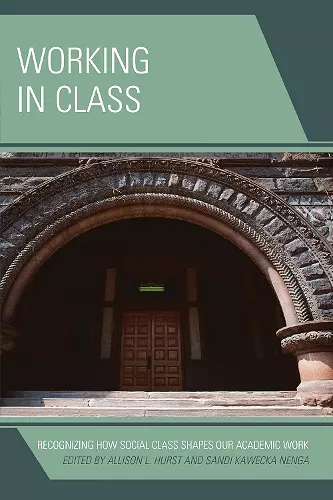Working in Class
Recognizing How Social Class Shapes Our Academic Work
Allison L Hurst author Sandi Kawecka Nenga author
Format:Hardback
Publisher:Rowman & Littlefield
Published:22nd Jan '16
Currently unavailable, and unfortunately no date known when it will be back
This hardback is available in another edition too:
- Paperback£38.00(9781475822533)

More students today are financing college through debt, but the burdens of debt are not equally shared. The least privileged students are those most encumbered and the least able to repay. All of this has implications for those who work in academia, especially those who are themselves from less advantaged backgrounds. Warnock argues that it is difficult to reconcile the goals of facilitating upward mobility for students from similar backgrounds while being aware that the goals of many colleges and universities stand in contrast to the recruitment and support of these students. This, combined with the fact that campuses are increasingly reliant on adjunct labor, makes it difficult for the contemporary tenure-track or tenured working-class academic to reconcile his or her position in the academy.
Students from working-class families struggle to succeed in universities run by individuals from more privileged backgrounds. Universities expand course offerings while reducing tenure track faculty positions, creating an underclass of highly educated, poorly paid adjunct instructors. Professors from working-class origins describe daunting barriers to career advancement, role rewards, and psychological well-being in the academy. And yet many faculty members and administrators minimize the significance of class in North American universities. This well-crafted volume offers fresh insights into the nature and consequences of socioeconomic class in higher education. Contributors draw on the work of sociologists C. W. Mills and Pierre Bourdieu to explore why class matters, examining the psychological and structural forces that have produced current conditions. The authors offer poignant narratives of their life experiences in the academy, describe research findings, and offer insightful syntheses of classic and more recent literature on how class dynamics affect teaching, research, and faculty service. The book includes a comprehensive, well-chosen, and timely reference list. It is essential reading for all who care about the future of higher education as a vehicle for upward mobility, including faculty members, graduate students, administrators, and educational policy makers. Summing Up: Essential. All readership levels. * CHOICE *
While social class is a prominent topic across disciplines, academics rarely turn the lens on themselves to consider how class operates in their own professional practice. Hurst and Nenga’s edited volume Working in Class offers a much needed corrective. Drawing on personal experiences and research from an interdisciplinary perspective, these authors engage in 'me-search' of the highest caliber. They offer critical commentary on how social class is alive — but not always alive and well — on their campuses and in their classrooms. Ultimately, the collective message is an empowering one, with recommendations for institutional change and, barring that, transformation of our classrooms into more democratic and class-aware spaces. -- Jenny M. Stuber, University of North Florida, author of "Inside the College Gates: How Class and Culture Matter in Higher Education"
Working in Class combines theoretical analyses of class effects and personal stories of fifteen academics of varying original class locations. As a collection, it is an invaluable guide to a multitude of key issues, such as how to survive in academia as a woman from the working class, and how best to teach low-income students of color. The book’s many informed voices and its structural clarity make it an important new look at the academy. -- Charles Sackrey, co-author (with Jake Ryan) of "Strangers in Paradise: Academics from the Working Class"
This anthology from a variety of disciplines and social locations across academia is a treasure trove of insight, information and practical advice for those four million of us who earn our livings in academe. But more than that it is a window into the dynamics of how higher education in the U.S. produces and reproduces the professional middle class and its culture. Its special vantage point is that the authors combine their personal experiences of social class with the rigors of their particular disciplines to reveal the unacknowledged class-cultural conflicts and outright classism that is routinely involved in “going to college.” For undergraduates it is the ideal text for bringing social class to the diversity discussion that today so richly informs many curricula. It’s not just about recognizing and overcoming classism, but as many of these authors demonstrate, there is great potential for transformative learning in wading into the very different experiences and values both students and faculty have depending on their zip codes of origin. The volume as a whole argues that these differences could easily become assets rather than liabilities if honest light is shed on them. Working in Class shines that light brilliantly. -- Jack Metzgar, Author of "Striking Steel: Solidarity Remembered"
ISBN: 9781475822526
Dimensions: 239mm x 159mm x 22mm
Weight: 508g
220 pages